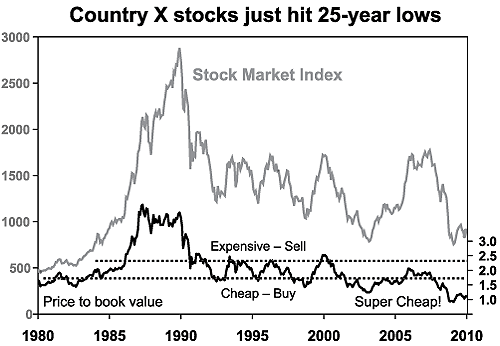| Home | About Us | Resources | Archive | Free Reports | Market Window |
Buying the World's Cheapest Stock MarketBy
Wednesday, March 3, 2010
There is no greater investment value in the world of stocks today... and possibly in all of history... than small stocks in Country X.
Astoundingly, Country X has 200 companies trading on its stock exchange for less than the cash on the books. Said another way, they're selling for less than FREE. If you could snap your fingers and buy all the shares of one of those companies, you'd have more cash than you spent... and you'd get an entire business for free. Take a look at just how cheap smaller companies in Country X are compared to some "popular" markets:
The popular markets have an average price-to-sales ratio of about 2. Meanwhile, small stocks in Country X have a price-to-sales ratio of 0.4. Small stocks in Country X would have to rise FIVEFOLD to be on par with these other markets. The average price-to-book ratio of the other countries above is about 3. Small stocks in Country X would have to rise nearly FOURFOLD to be in line with these other countries based on this measure. You might think, for stocks to be this cheap, something has to be terribly wrong in Country X... But I assure you it's quite normal. It's a nice place to visit. I was there a few years ago and was amazed. The cab drivers wear dress suits and gloves and are incredibly polite... Heck, even the street-sweepers dress formally. Country X is not Pakistan or Venezuela... or some other dangerous place to put your money. But its shares – unbelievably – are a better value than stocks in Pakistan and Venezuela. Country X is actually less corrupt than the U.S., according to Transparency International's 2009 Corruption Perception Index. Citizens obey the laws, and your money is safe. Brazil and Russia might be hip with investors... Stock markets in those countries were up over 100% last year. Country X's main market was up only 2% in 2009. You haven't missed a thing in Country X. Country X is not an "emerging" market at all. It is a developed country with some of the highest incomes in the world... Income per person is nearly US$40,000. Stocks are cheap in Country X simply because investors have given up hope. You'd give up, too... Stocks in Country X hit 25-year lows last year!  Here's an idea of how much Americans have given up hope on Country X's stocks: In 2006, a Rydex fund of Country X stocks had about $200 million invested. Today, it has less than $5 million invested. In 2006, the iShares Country X fund had $15 billion in assets. Today, it has $5 billion. In short, nobody cares. In my True Wealth investment advisory, I look for three things in an investment: cheap, hated (or ignored), and an uptrend. That's why I recommended buying a fund of small Country X stocks in the latest issue, which went to print last week. Small stocks in Country X basically set records for the first two categories. For cheap, we're at valuations "never seen in the history of investing." And for ignored, the market is near 25-year lows. The uptrend is there, too... Shares of my Country X recommendation clearly bottomed in October 2008 and again in March 2009. As I write, they're just a few cents away from new highs for this year. To end the suspense, Country X is Japan. For me, buying small Japanese companies today is like buying gold in 2002. If you missed gold then, don't miss this now... In 2002, investors were completely apathetic about gold. I couldn't get people interested in the least. I don't think anybody took me up on my recommendation. I actually lost some subscribers for recommending gold back then. They wanted the next hot dot-com... and I wasn't going to give it to 'em. But gold soared, and dot-coms did nothing. Don't make that mistake with small Japanese stocks today. They're cheap. They're ignored. And they're in an uptrend. Buy shares of small companies in Japan today. Good investing, Steve P.S. In the latest issue of True Wealth, I recommend the perfect way to make this trade. It's easy, it's safe, your downside is 25%, and your upside potential is making a few times your money. Odds like that don't come along often. If you're not yet a subscriber to True Wealth, click here. Market NotesTHIS CURRENCY TRADE IS SCREAMING
"Wow." That's the word that describes the massive decline in the British pound since we said "look out below" last month.
On February 6, we showed you a chart of the impending breakdown in the value of Britain's paper currency, the pound. Britain's government is a world leader in excessive spending and excessive debt. Since "there ain't no such thing as a free lunch," it was only reasonable to expect the breakdown to lead to more pound weakness. But even we didn't expect the clobbering you see in the chart below, which shows the past year's trading in FXB, a fund that tracks the British pound. FXB has lost 4.3% in the past month. While this doesn't sound like much, it's an enormous fall for a major currency... one millions of people must use to carry out basic transactions. Currencies are the aircraft carriers of the financial world. Once they get a head of steam built up and begin trending, they take a long time to change course... so currency traders can continue to take a bearish bias here. Or you could take the excellent "sleep at night" currency advice from our colleague Porter Stansberry and simply trade paper pounds for gold and silver. |
In The Daily Crux
Recent Articles
|

